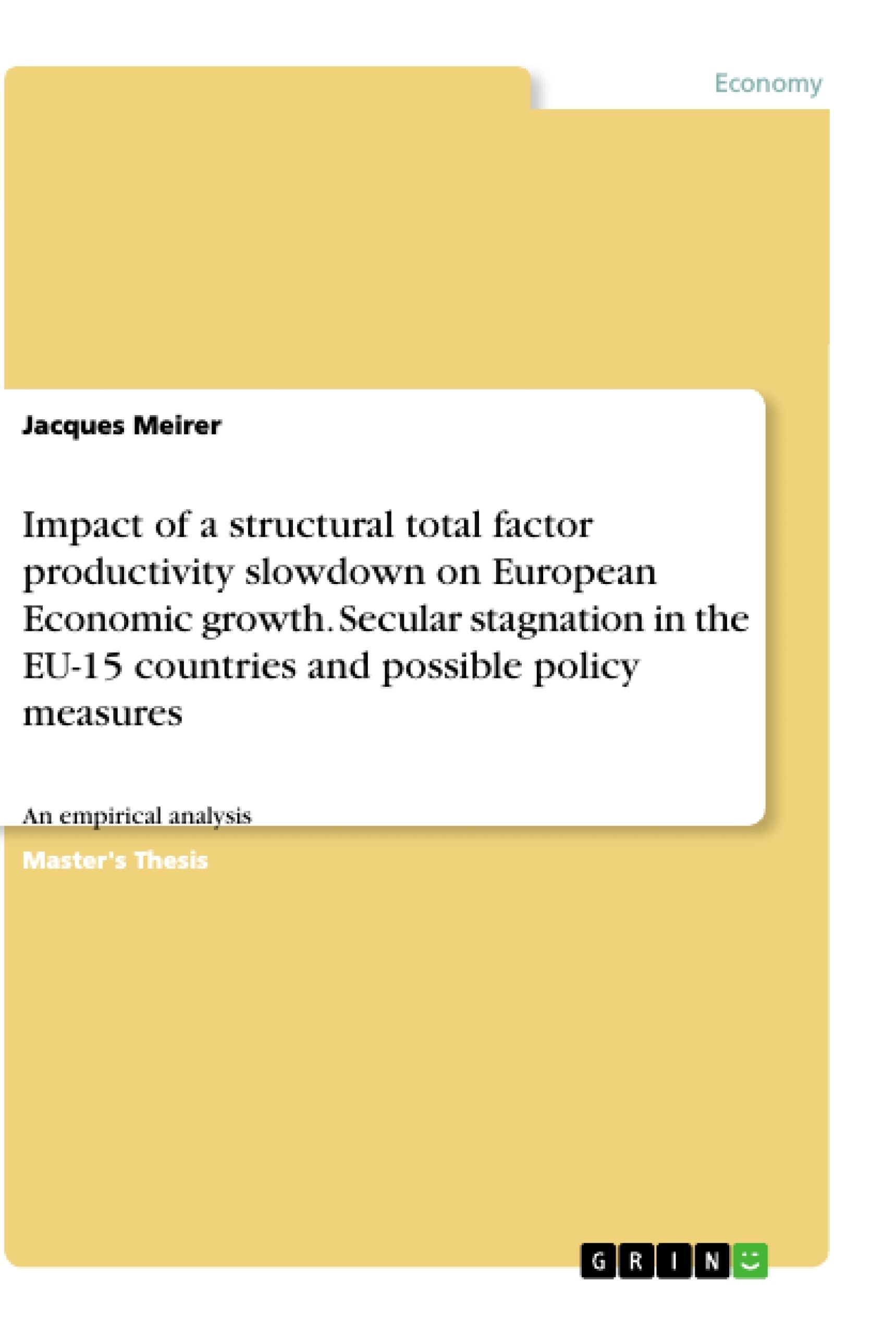The aim of this thesis was to identify the background and determinants of the stagnating economic growth in the EU-15 countries and to evaluate whether the region has entered a secular stagnation. To this end, the inuence of a structural total factor productivity (TFP) slowdown on European economic growth was empirically examined. In order to obtain the results for this study, a logit panel regression was carried out with the EU-15 countries over the period from 1950 to 2017. It became particularly clear that the TFP slowdowns increased over the years while TFP upswings decreased. This tendency can mainly be attributed to a lack of human capital, too little intra-European cooperation, too many regulatory hurdles and too much employment in the services sector. These highly structural factors and their inuence on TFP growth and, ultimately, economic growth, demonstrate that the EU-15 countries have fallen into an economic stagnation dynamic that is strongly reminiscent of the model of secular stagnation. Only the way in which policymakers deal with the current pandemic will show how strong and protracted the current stagnation of economic growth will be.
Inhaltsverzeichnis (Table of Contents)
- Introduction
- Theoretical framework of European secular stagnation
- Importance of growth
- Growth accounting
- The Importance of productivity and TFP
- Definition of secular stagnation
- Secular stagnation, productivity and their causes in Europe
- Literature concerning secular stagnation and productivity
- Determinants of productivity in the EU-15 area
- European values
- Education and human capital
- Energy prices and use of energy per capita
- Sectoral composition
- European cooperation, economies of scale, resource allocation
- Trade, Investment Share, FDI
- Methodology
- Introduction to the data set
- Considered variables
- TFP-Slumps
- T-Tests
- The TFP-slump environment
- Regression Analysis
- Logit panel data analysis
- Analysis of the criteria
- GDP per capita
- Education and human capital
- European values
- Europe-wide cooperation, economies of scale, resource allocation
- Energy prices / use of energy per capita
- Sectoral composition
- Policy
- Monetary policy
- Fiscal policy
- Structural reforms
- Conclusions and Implications
Zielsetzung und Themenschwerpunkte (Objectives and Key Themes)
This master thesis aims to empirically analyze the influence of a structural slowdown in total factor productivity on European economic growth. It examines the background and determinants of stagnating economic growth in the EU-15 countries, specifically whether the region has entered a phase of secular stagnation.
- Impact of structural TFP slowdown on European economic growth
- Determinants of stagnating economic growth in EU-15 countries
- Evaluation of whether the region has entered secular stagnation
- Analysis of factors influencing productivity and TFP growth
- Policy recommendations to address the TFP slowdown and potential secular stagnation
Zusammenfassung der Kapitel (Chapter Summaries)
Chapter 2 provides a theoretical framework for understanding European secular stagnation, outlining the importance of economic growth, the relevance of TFP growth, and the concept of secular stagnation. Chapter 3 delves into the literature on secular stagnation and productivity, exploring both demand-side and supply-side explanations for this phenomenon. It then identifies key determinants of productivity in the EU-15 region, examining factors such as European values, education, energy consumption, sectoral composition, and international trade.
Chapter 4 outlines the methodology used in the empirical analysis, including the data sources, variables, and criteria for identifying TFP slumps and upswings. Chapter 5 presents the results of the logit panel regression analysis, which investigates the influence of various factors on the probability of TFP slumps. These findings provide valuable insights into the drivers of productivity decline and offer evidence for potential policy interventions.
Schlüsselwörter (Keywords)
The primary keywords and focus topics of this thesis are: European economic growth, secular stagnation, total factor productivity (TFP), productivity slowdown, human capital, education, energy prices, sectoral composition, European integration, trade, investment, structural reforms, monetary policy, fiscal policy.
Frequently Asked Questions
What is "secular stagnation"?
Secular stagnation describes a prolonged period of little or no economic growth within an economy, often driven by structural factors rather than temporary cyclical downturns.
What role does Total Factor Productivity (TFP) play in economic growth?
TFP measures the efficiency of all inputs in the production process. A slowdown in TFP growth is a major determinant of stagnating overall economic growth in the EU-15 countries.
What are the main causes of the TFP slowdown in Europe?
Key factors include a lack of human capital, regulatory hurdles, insufficient intra-European cooperation, and an over-reliance on the services sector.
How do energy prices affect European productivity?
High energy prices and inefficient energy use per capita are identified as significant determinants that can hinder industrial productivity and TFP growth.
What policy measures are recommended to combat stagnation?
The thesis suggests a combination of structural reforms, targeted fiscal policies, and monetary measures to address the underlying causes of the TFP slump.
- Citation du texte
- Jacques Meirer (Auteur), 2020, Impact of a structural total factor productivity slowdown on European Economic growth. Secular stagnation in the EU-15 countries and possible policy measures, Munich, GRIN Verlag, https://www.grin.com/document/960365



